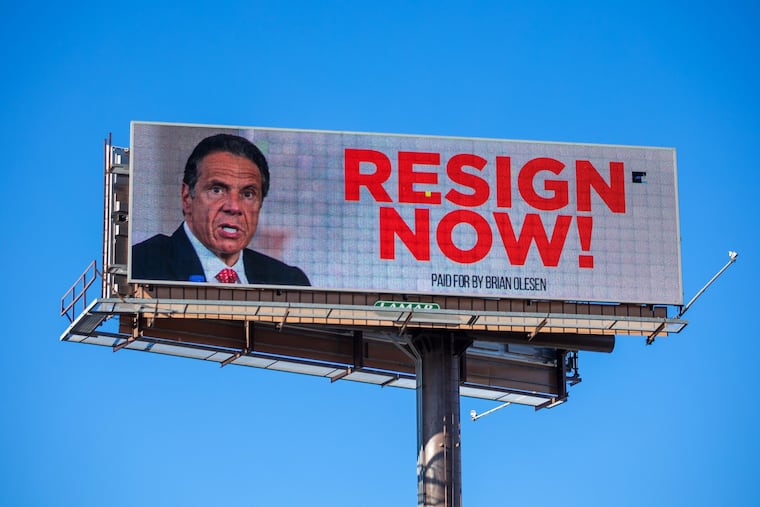Cuomo’s resignation, infrastructure, and why I no longer believe pundits who predict America’s bleak future | Opinion
Both Cuomo’s resignation and the infrastructure bill are an important reminder that everything is impossible until it isn’t.

A few weeks ago, no one would have believed that the 30 minutes between about 11:40 a.m. and 12:10 p.m. on Tuesday morning would unfold as they did.
Just after noon, Gov. Andrew Cuomo announced that he will be resigning as New York’s governor. Cuomo has been accused of sexual harassment and creating an abusive atmosphere in the governor’s office by multiple women. Last week, New York Attorney General Letitia James released a report about her office’s investigation into the allegations. “I believe these 11 women,” James said in a press conference, adding that Cuomo violated state and federal law.
» READ MORE: New York Gov. Andrew Cuomo resigning over sexual harassment
A defiant Cuomo followed with a ludicrous press conference in which he dismissed the allegations as a cultural and generational misunderstanding — he thought he was spreading joy and is sorry the women didn’t understand that. Calls for his resignation flooded in from Democrats, including President Joe Biden.
But Cuomo wasn’t going anywhere. That message was as ubiquitous as calls for his resignation. “I can tell you what I can’t imagine, which is that Andrew Cuomo voluntarily leaves this job,” New York Times reporter Shane Goldmacher said on The Daily podcast. A National Review headline declared “Cuomo won’t go.” A commentary in The Nation promised, “[Cuomo] will fight for his political career till his last dying breath.” A Fox News commentator predicted, “Smug Cuomo will never resign despite sexual harassment probe.”
Cuomo will never resign, people agreed — until he did.
On Tuesday morning, the New Yorker’s Ronan Farrow published a story detailing Cuomo’s attempt to pull strings at the Obama White House to stop a federal prosecutor’s investigation into his conduct — Cuomo stepped down hours later.
Meanwhile, a few minutes before Cuomo’s address started, the U.S. Senate was busy with something different. At about 11:40 a.m., they passed a $1 trillion bipartisan infrastructure deal with a 69-30 vote. It shouldn’t have happened, not according to weeks of political coverage that mourned the BIF (bipartisan infrastructure framework). Starting in June, headlines declared BIF “dead on arrival.” A Politico Playbook headline from July read, “RIP BIF?” In August Playbook wrote that “the bipartisan deal hit a snag” and described a multidimensional “paranoia” between parties and within parties.
And then, the bill passed the Senate with the support of 19 Republicans — and with talks on a larger, more progressive reconciliation bill very much alive.
Thankfully, I didn’t have to give public predictions on these two situations. But if I had to, not long ago I also would have said the bipartisan deal would collapse and Cuomo would stay in office until the bitter end.
But there is a lesson in those 30 minutes in which reality defied conventional wisdom: Everything is impossible until it isn’t.
» READ MORE: Here’s what Pa.’s and N.J.’s chunk of the $1 trillion infrastructure bill might buy
Some might take away from both the infrastructure vote and Cuomo’s resignation that good things will eventually happen. That’s wrong. The arc of the moral universal might bend toward justice, but only because there are people working extremely hard to bend it.
The lesson is that every fight is worth fighting.
Right now, America is in a fight for its form of democracy, which has existed for just over half a century.
The For the People Act and the John Lewis Voting Rights Act, both critical pieces of legislation, are stalled. On the Republican side of the aisle, there is unity behind limiting rather than expanding American democracy. On the Democratic side, a few senators, namely Joe Manchin and Kyrsten Sinema, would rather preserve an archaic procedural rule, the filibuster, than protect the right to vote with a simple majority.
Again, the outcome seems forgone. A Slate headline: “Manchin and Sinema Won’t Change Their Minds.” A former Manchin adviser told the New Yorker, “I would bet a year of my salary that he would not agree to change the filibuster.”
Current and former aides of Cuomo made similar statements — until they were proven wrong.
What we learned through Tuesday’s surprise outcomes is that the only way to ensure that Manchin and Sinema won’t change their mind is to stop demanding it.
The political press and cable news panels tend to police the positions and tactics of activists and movements. “Experts” use conventional wisdom to determine what is and isn’t possible — and thus what is and isn’t worth fighting for. But conventional wisdom keeps getting rebuffed.
» READ MORE: Cori Bush’s eviction victory reminds Dem establishment why it can’t win without progressives | Will Bunch
On Aug. 3, after U.S. Rep. Cori Bush camped on the U.S. Capitol steps to protest the expiration of the CDC’s eviction moratorium, a St. Louis Post-Dispatch editorial headline read: “Cori Bush’s antics generate publicity, but they won’t change political reality.” The Biden White House renewed the moratorium later that day — and Senate Majority Leader Chuck Schumer told Bush afterward, “You did this.”
Whether it is finally rising to the moment on climate to enact a Green New Deal, getting every person health insurance through Medicare for All, or ending the Israeli occupation of Palestine, 30 minutes on Aug. 10, 2021, taught us that the fight is worth it even if conventional wisdom predicts the goal is out of reach.
Even the obvious is not a forgone conclusion in American politics (just ask Hillary Clinton). It’s time to listen less to the supposed wisdom of pundits, and more to those who chart a path to just, progressive outcomes.